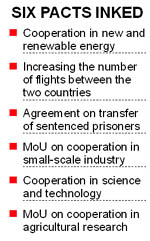chief
Prime VIP

New Delhi, July 9
In their first interaction after the UN imposed the fourth round of sanctions on Tehran last month over its controversial nuclear programme, India and Iran today signed six pacts, including one on cooperation in new and renewable energy and another on increasing the number of flights between the two countries.
The MOUs were signed at the end of the two-day meeting of the India-Iran joint commission, co-chaired by External Affairs Minister S M Krishna and visiting Iranian Minister Seyed Shamsodin Hosseini.
The other four accords are: agreement on transfer of sentenced prisoners; MOU on cooperation in small-scale industry between the National Small Industries Corporation (NSIC) and the Iranian Small Industries and Industrial Parks Organisation (ISIPO); programme of cooperation on science and technology; and MOU on cooperation between the Central Pulp and Paper Research Institute (CPPRI) of India and the Gorgan University of Agricultural Science and Natural Resources (GUASNR).
The signing of the agreements clearly reflected New Delhi’s intention that it would pursue an independent policy on Iran, notwithstanding the American pressure on it not to enlarge the area of its engagement with Tehran.
Although it is committed to abide by the UN sanctions on Tehran, New Delhi maintains that the Iranian nuclear issue must be resolved through negotiations since the sanctions would only hurt the common Iranian people. While recognising Iran’s right to develop nuclear energy for peaceful purposes, it has also advised Iran to strictly abide by the IAEA guidelines while pursuing its nuclear programme.
The Iranian Minister indicated that his country was keen to boost its economic and commercial links with India. Hosseini, who also held meetings with Prime Minister Manmohan Singh and Finance Minister Pranab Mukherjee during his stay in the Indian capital, proposed a bilateral investment protection treaty between the two countries and called for doubling the bilateral trade from $15 billion at present to $30 billion in the next five years.
On the much talked about India-Pakistan-Iran (IPI) gas pipeline, he said the two countries would take forward talks on the project soon and come to an agreement. He said his country was committed to the successful implementation of the pipeline as it was of the firm view that Asian nations should play a much bigger role in the global economy.
The two sides are also understood to have discussed the situation in Afghanistan at length with both of them expressing their common stakes in the stability of the violence-torn country. New Delhi is believed to have pressed for structured and regular consultations with Tehran on defeating terrorists in Afghanistan and in the region.
The Iranian side is also understood to have agreed to step up the pace of work at Chabahhar port that will provide Indian goods an alternative access route to Afghanistan, by bypassing Pakistan.
